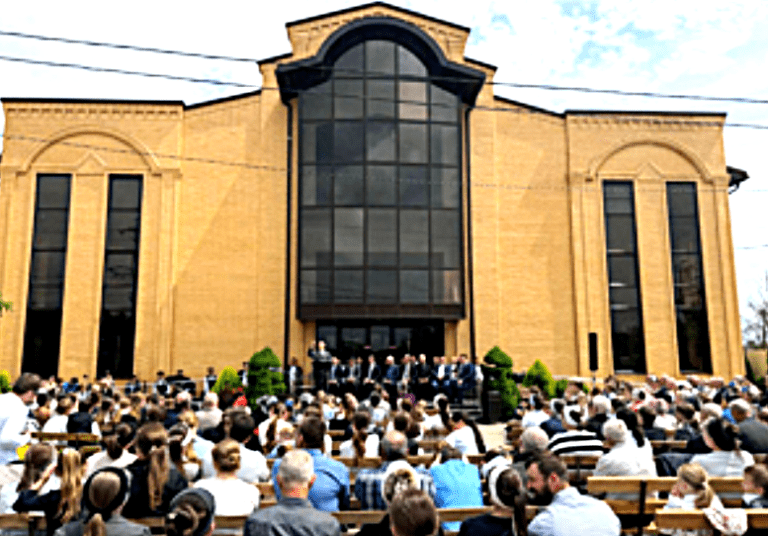Last year, Russian courts strengthened civil bans on Baptist churches for holding meetings without state permission, according to human rights group Forum 18.
Secret police surveillance, searches, and prosecutions of suspected illegal missionary activities currently affect at least 10 Church Council Baptist communities that have refused state registration. From 2024, the number of prohibited items will increase.
Forum 18 reported that the court issued three recent bans in the Krasnodar region, suspending church activities in Timashovsk on October 13, Armavir on September 30, and Tuapse on September 22.
“This practice will only grow,” lawyer and religious rights activist Sergei Chugunov wrote on Telegram on October 23, adding that authorities must overturn the ban.
A district court has banned a Baptist church from operating in Timashovsk, four months after prosecutors conducted an inspection during a church service in June. Prosecutors subsequently filed a civil lawsuit on July 10 seeking a ban on church activities.
The Intermediary Office of the Council of Baptist Churches subsequently issued a statement challenging the legality of the raid, saying: “The prosecution has not shown any signs of serious, material, repeated or socially significant violations as required by Supreme Court Plenary Resolution No. 64 of December 27, 2016.”
In Tuapse, prosecutors cited previous fines imposed by authorities on pastor Anatoly Muki and other church members for “illegal missionary activities” after successfully seeking a ban on the local Baptist church.
In Armavir, the city court granted the prosecutor’s request and banned the church. Pastor Vladimir Popov, a Baptist church pastor, received multiple fines in 2021, including one of 5,000 rubles (US$62), for leading services from his home. He lost his appeal against the 10,000 rubles (US$124) fine on October 15.
Forum 18 reported that Christian groups continued to meet “despite court decisions banning their activities.”
“The ‘witch hunt’ continues in Russia,” lawyer Anatoly Pcherintsev wrote on his Telegram channel on October 23, the same day that an appeals court upheld a previous ban on the church in Russia’s Mariel Republic.
The Baptist Church Council asserts its constitutional right as Russian citizens to gather for worship without officially registering with the state. These refer to rights under the 1997 Religious Law and the Russian Constitution, alongside the country’s international human rights obligations.
In contrast, Russian prosecutors argue that gathering religiously and sharing faith with others is defined as a religious group and must be registered. Lawyers told Forum 18 that this means other Protestant groups are at risk of repression by not registering.
“The impossibility of correcting the violation is a precondition for banning the activity,” said legal advocate Chugunov. “However, in cases such as this, the court itself states in its decisions that the activity is prohibited until a notice is filed. This therefore means that the violation is remediable (even if we consider it so) and the prohibition is illegal.”
On June 16, members of the State Duma, the lower house of Russia’s parliament, introduced a bill that would completely ban public worship, religious ceremonies and rituals in non-residential premises of residential buildings and apartment complexes.
The bill, titled “Amending Articles 12 and 16 of the Federal Law on Freedom of Conscience and Religious Associations,” would prohibit the Ministry of Justice from registering religious organizations that hold religious services in residential or non-residential premises.
Lawmakers argued that groups gathering for public religious events were causing a nuisance to residents.
“The gathering of large groups of strangers, including illegal immigrants, who do not live in apartments increases the risk of aggravating local crime, gives rise to domestic disputes, and violates fire and public safety regulations,” the bill’s explanatory text, translated from Russian, says.
Novaya Gazeta Europe reported on August 12 that the proposed amendments would affect most prayer rooms of the Baptist Council of Churches.
On October 1, the federal government questioned the proposal, saying it needed “substantial amendments” because Part 2 of Article 16 of the Religion Law allows “worship, religious rites and rituals to be carried out without hindrance in residential premises.” It remains unclear whether the National Assembly will pass this bill as is.
“I have a question for the legislators who are trying to quickly pass prohibitive and punitive laws,” lawyer Pcherintsev wrote on Telegram. “What is stopping us from introducing clarity and certainty into the legislation on this issue so that the faithful are not distressed?”
Other bans reported by Forum 18 include the Kurganinsk church in the Krasnodar region. Bailiffs physically sealed off the building and forced church members to meet outdoors. The ban, which came into force on September 6, 2024, led to a legal challenge by Pastor Aleksandr Chimyuk. He lost his appeals on November 26, 2024 and May 7, 2024, but the Russian Supreme Court dismissed his appeal without consideration on August 29.
Rodniki Church, also in the Krasnodar region, faced a ban on December 24th, but it became legal on April 3rd after an unsuccessful appeal by pastor Vladimir Gordiyenko. The Fourth Court of Cassation upheld the ban on October 29.
The City Court banned the activities of Yoshkar-Ola Church in Mariel Republic on July 24th, and the ban went into effect on October 23rd after the Mariel Republic Supreme Court rejected its appeal.
The Blagoveshchensk City Court in Russia’s Far East was scheduled to issue a verdict today (November 13) on a civil lawsuit brought by the prosecutor’s office against the local Church Council Baptist Church.
